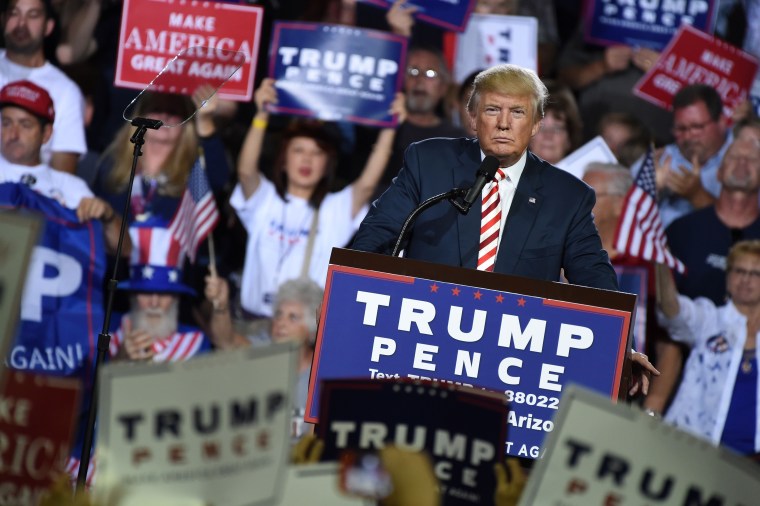Donald Trump’s repeated visits to deep-red Arizona have some of the state’s leading Republicans at best puzzled and at worst, annoyed.
“The general feeling’s kind of been just mystified that he keeps coming here because it seems odd to come to Arizona so much rather than going to the swing states.… It seems like there should be states they’re more worried about,” said a GOP operative involved in Arizona campaigns.
Trump’s latest visit to the state Tuesday evening — his sixth of the cycle — makes some sense in the context of the tightening presidential race there. Four of the last five public polls of the race there showed it to be virtually tied, with Hillary Clinton or Trump leading by just a point.
But within that context, his Tuesday visit remains quixotic, since Prescott Valley is in a deep-red county that went nearly 65 percent for Mitt Romney in 2012. And as Trump tends to carry controversy wherever he goes, some Arizona Republicans are wary of his plans.
“I dunno if its particularly helpful to anyone here for him to come,” the Arizona Republican operative said.
“Every time he’s come [to the state], it kind of sucks up all the energy from everything else going on. If you’re not attending [you’re asked], ‘Why not? Are you distancing yourself?’ If you are, it’s ‘Are you getting too close to him?’”
The operative added: “It’s just kind of annoying from that perspective.”
That was the case in August, when Trump put endangered Arizona Sen. John McCain in a bind by delivering a fiery speech laying out a hard-line immigration policy that effectively called for mass deportation and eliminated any possibility of a pathway to citizenship for those here illegally.
McCain was a member of the Gang of Eight group of bipartisan senators that tried and failed to push through Congress a more moderate view of immigration reform, one that included a pathway to citizenship. His advocacy on the issue has drawn him considerable blowback from conservatives and, this cycle, the strongest primary challenge of his career.
McCain seems likely at this point to win reelection, and easily outrun Trump — his margin in the polls has expanded even as Trump's has narrowed.
Dealing with the controversy at the top of the ticket, however, hasn't made things easy.
Grant Woods, a longtime friend of McCain who served as his first chief of staff, said he had spoken to the senator the day after Trump's immigration speech and McCain was less than enthused.
“I think its fair to say that he would’ve preferred that that not happen,” Woods said when asked if McCain was frustrated with Trump’s speech.
Woods himself was a bit more blunt.
“I would’ve preferred he not give the speech at all, and if he was going to give it somewhere, maybe in Alaska. I personally thought the speech was embarrassing for all involved,” he said.
Weeks before, McCain himself seemed visibly frustrated when members of the media pelted him with question after question about his support for Trump.
"I have covered that issue, I have covered that issue, I have covered that issue completely and I have nothing more to say about it," McCain said at a press conference, interrupting a reporter asking about Trump. "I am supporting the nominee of the party and I will continue to run my own campaign."
But political operatives in the state speculate Trump simply can’t stay away.
In the deep-red parts of the state, the candidate turns out huge, enthusiastic crowds, that offer immediate and visceral positive feedback for Trump’s message.
“I am so glad to be back in Arizona, a state that has a very, very special place in my heart," he said to a packed house — “a beautiful crowd,” Trump said at the time — during his last visit, in Phoenix. "I love the people of Arizona, and together, we are going to win the White House in November."
It also holds sentimental value for Trump. Controversial Maricopa County Sheriff Joe Arpaio and former Arizona Gov. Jan Brewer were two of his early prominent endorsers, and it offers a compelling backdrop for his immigration reform message.
And Trump backers in the state dismiss the suggestion that the candidate has caused Arizona Republicans any heartburn with his frequent visits. Former Arizona Republican National Committeeman Bruce Ash, who's supporting Trump, said that "everybody is happy about [Trump’s primary win] and confident he’s going to win in November. This is sort of a non-issue."
